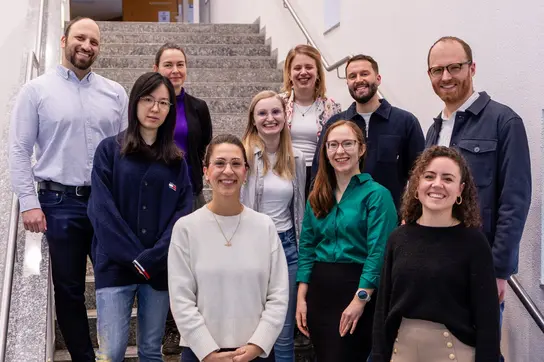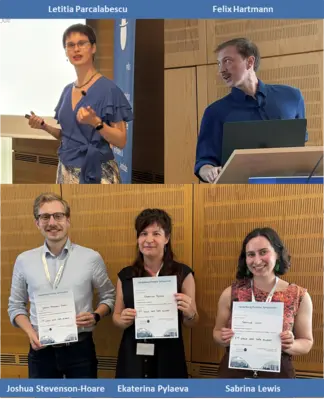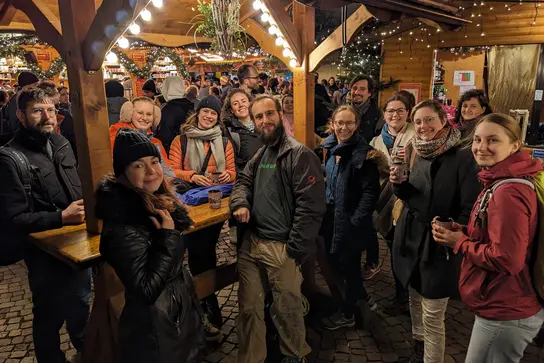Postdoc Network
The Postdoc Network (PDN) was formed to represent the Postdocs' interests and to achieve the best conditions for career perspectives and scientific output.
Main Topics of the PDN
- Our website and mailing list provide general information about the PDN and offer a platform for Postdocs to communicate with each other and discuss issues important to them.
- The PDNC represents the Postdoc voice within the DKFZ, and to other organizations such as the Helmholtz Network and the Health+Life Science Alliance throughout Germany.
- In collaboration with the DKFZ Advanced Training Center, the PDN organizes seminars and workshops tailored to Postdocs' needs.
- Together with the Career Service the PDN organizes Career Days. The aim is to provide postdocs at our institute with insights into different career paths in specific fields. We invite alumni and other (postdoctoral) researchers to briefly share their personal career paths. The participants are given ample time to join round table discussions and to network with invited guests.
- The Annual Symposium aims to encourage scientific and social interactions between Postdocs in order to improve the research and personal experience of scientists.
- The Lunch Talk Series was started by the PDN and the BioMed X Innovation Center to provide a platform for intellectual exchange between researchers working in diverse fields of life science research in Heidelberg.
- The “Research Lounge – let’s talk science” encourages scientific collaboration and discussion within the DKFZ.
DKFZ Postdoc LinkedIn page

We have a new LinkedIn page for Postdocs of the DKFZ: https://www.linkedin.com/showcase/dkfz-pdn! On this page, we’ll also keep you updated on current and past events, post pictures of life at the DKFZ and more importantly create a place to shine a light on your achievements. So let us know (pdn-committee@dkfz-heidelberg.de) if you have something to highlight. And of course, follow the page!
Christmas Market
The PostDoc Network Committee
If you are interested in keeping up to date with Postdoc news and events, please subscribe to the Postdoc Network mailing list (PDN@dkfz.de) by emailing postdoc(at)dkfz-Heidelberg.de.
Join the PDN committee by subscribing to the PDN committee mailing list by emailing to PDN-committee(at)dkfz.de and by attending the fortnightly committee meetings. What we do:
- Improve communication and spread information between Postdocs
Welcome incoming postdocs by providing them with relevant information concerning their work at the DKFZ and their life in HeidelbergImprove communication and spread information between Postdocs - Organize of events and seminars
- Share and discuss career- & Postdoc-related issues
We are always looking for new PDN committee members!

Current Members
-
Dr. Mohammad Abukhalaf
Speaker
-
Kyra Fuchs
Speaker
-

Mariam Amghar
-
Dr. Sophie Bromberger
-
Dr. Jaydeep Bhat
-
Laura de Cubas Landaluce
-
Dr. Yasmin Dabiri
-

Caroline Isabel Fandrey
-
Sanja Jelaca
-

Dr. Thomas Kerzel-Gnaneswaran
-

Dr. Simon Linder
-

Dr. Alexandra Lipka
- Show profile
Dr. David Schmidl
-
Agnieszka Seretny
In the past: Heidelberg Postdoc Symposium 2025

The Heidelberg Postdoc Symposium 2025 on June 27th at the DKFZ communication center, was a vibrant day full of lively discussions, exchange, and delicious coffee. We want to thank our keynote speakers Letitia Parcalabescu for sharing how LLMs can be used for scientific research and Felix Hartmann for showing us how single cell metabolomics can impact cancer treatment. A shoutout to all speakers and poster presenters with special congratulations for the award winners: Joshua Stevenson-Hoare (1st place short talk), Sabrina Lewis (2nd place short talk), Ekaterina Pylaeva (3rd place short talk), Erwin Kupczyk and Mohamad Saoud (1st place poster), Maria Bekker-Nielsen Dunbar (2nd place poster), Noémie Lejeune (3rd place poster), and Tanja Kuhm (4th place poster)! This event was generously sponsored by InVivo Biotech and PromoCell.
Gallery

A stroll along the Weihnachtsmarkt with postdocs from DKFZ and Uni Heidelberg (COS)










